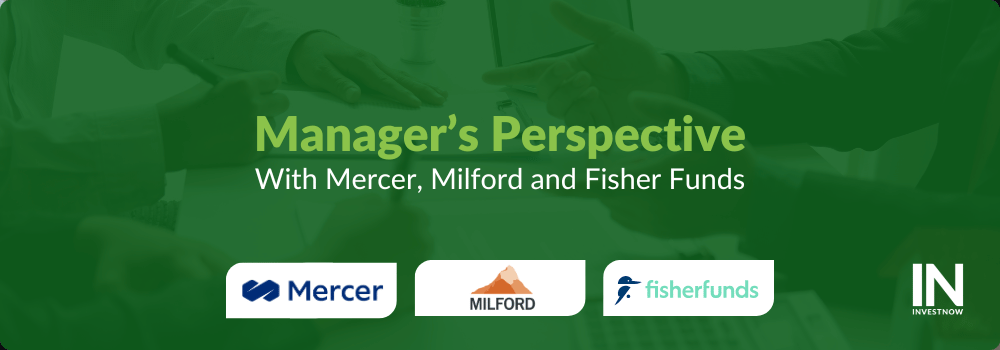
Why investing now is the best decision you can make
Welcome to our October 2024 Manager’s Perspective. Each month, InvestNow reaches out to selected investment managers with questions about our monthly theme. This month, we’ve asked Mercer, Milford and Fisher Funds to share their insights on why investing now is the best decision you can make. You’ll find our questions and their expert responses below.
Padraig (Paddy) Brown
Chief Investment Officer New Zealand
Mercer


Q1: One of our guiding investing principles is to “Invest Now”, which codifies the age-old investing wisdom that the best time to start investing is right away – why is starting your investing journey early so important? What if you’re a Kiwi that only started learning about investing later in your life, is investing still worth doing in your 40s and 50s?
Think of investing is like planting a tree: the younger you are when you plant it, the more time you have to see it possibly grow. Time horizon is crucial when it comes to investing. The earlier you start, the more opportunity for compound interest, which is essentially earning interest on your interest. This can turn even a modest contribution into a substantial nest egg over time with favourable rates. Plus, starting early maximises your opportunity to ride out market fluctuations, giving you the confidence to ride out the fluctuations of economic ups and downs.
If you start investing in your 20s, and live a long and healthy life, you have decades for your money to grow. By the time you get to retirement, you could be looking at a financial forest instead of just a sapling.
If you’re a Kiwi who’s just starting to dip your toes into the investing waters in your 40s or 50s, don’t worry. It’s never too late to start investing. While you may not have the luxury of decades ahead of you, you still have plenty of time to try and make a significant impact on your financial future.
Investing in your 40s and 50s can be incredibly rewarding. You are likely to have a better understanding of your financial goals and a clearer picture of your risk tolerance. Plus, you may have leverage through your existing savings to make more substantial investments. Think of it as a late-blooming flower: it may take a little longer to blossom, but with the right care and attention, it can still flourish.
Remember, every little bit counts. Even if you can only invest a small amount, it can add up over time. And with the right strategy, you can still build a robust portfolio in support of your retirement dreams. So, grab your gardening gloves and start planting those financial seeds today.
Q2: The investment universe can often seem so vast and complex – before jumping into a new investment for the first time, what would you say are the 3 most important things that investors should consider?
The investment world can feel overwhelming, but with the right approach, you can make informed decisions. Here are three essential things to consider before making your first investment:
- Define Your Goals: Understanding what you want to achieve with your investments is crucial. Are you saving for retirement, a major purchase, or your children’s education? Clearly defined goals will help you determine the right investment strategy and time horizon, guiding your choices along the way.
- Assess Your Risk Tolerance: Every investor has a different comfort level when it comes to risk. Consider how much volatility you can handle in your portfolio. Are you comfortable with the ups and downs of the stock market, or do you prefer more stable, lower-risk options? Knowing your risk tolerance will help you build a portfolio that aligns with your financial situation and peace of mind.
- Research Investment Options: Take the time to educate yourself about the various investment vehicles available, such as stocks, bonds, mutual funds, and ETFs. Understand their potential returns, risks, and how they fit into your overall strategy. The more informed you are, the better equipped you’ll be to make decisions that align with your goals.
By keeping these three considerations in mind, you should be well-prepared to navigate the investment landscape and make choices that support your financial future.
Q3: While KiwiSaver has been a great initiative to get New Zealanders to start investing early, the other key element to success is investing enough. Is the current 3% default KiwiSaver contribution rate most New Zealanders are on enough? If not, how should Kiwis consider investing today to have enough in their later years?
The current default KiwiSaver contribution rate of 3% may not be sufficient for most New Zealanders to achieve their desired retirement lifestyle. While this rate provides a foundational level of savings, individuals often have varying financial needs and goals, which can significantly impact their retirement outcomes.
In the 2024 Mercer CFA Institute Global Pension Index, New Zealand’s retirement system achieved a B grade again, ranking 14th out of 48 retirement systems around the world. This result recognises the strength of the scheme’s foundation, however it also highlighted the need for both increased coverage and the level of contributions into KiwiSaver to further strengthen the ability of New Zealanders to retire well. For those who can contribute more, increasing KiwiSaver contributions can be a strategic move. Considering gradually raising the contribution rate to 4% or even 6%, if their financial situation allows. This may enhance savings over time, especially when combined with employer contributions and government incentives.
For Kiwis who may not be able to contribute more due to financial constraints, it’s good to explore other options. Here are a few strategies to consider:
- Diversify Investments: Beyond KiwiSaver, consider other investment vehicles such as managed funds, stocks or bonds. Diversifying your investments can help you build a more robust portfolio that aligns with your risk tolerance and financial goals.
- Focus on Long-Term Growth: If you have a longer investment horizon, you may wish to consider more growth-oriented investments that may offer higher returns over time. Things like equities or property historically have provided better long-term growth compared to more conservative options.
- Regularly Review Your Financial Plan: Life circumstances change, and so should your investment strategy. Regularly reviewing your financial plan can help you adjust your contributions and investment choices based on your evolving needs and market conditions.
- Seek Professional Advice: If you’re uncertain about the best approach for your situation, consider consulting a financial advisor. They can provide personalised guidance tailored to your financial goals and help you navigate the complexities of investing.
In summary, while the 3% default KiwiSaver contribution rate serves as a starting point, many Kiwis may need to consider increasing their contributions or exploring additional investment options to ensure they have enough savings for a comfortable retirement. Taking proactive steps today can significantly impact your financial well-being in the years to come.
This article has been prepared by Mercer (N.Z.) Limited. The information contained in this article is intended for general guidance only. It does not take into account your particular financial situation or goals. Before making any investment decision, you should refer to the Product Disclosure Statement or consult an appropriately qualified financial adviser.
Murray Harris, Head of KiwiSaver & Retail
Milford


Q1: One of our guiding investing principles is to “Invest Now”, which codifies the age-old investing wisdom that the best time to start investing is right away – why is starting your investing journey early so important? What if you’re a Kiwi that only started learning about investing later in your life, is investing still worth doing in your 40s and 50s?
Starting your investment journey early is advantageous due to the power of compounding, where your investment returns generate further returns over time. The longer your investments are compounding, the greater the potential for growth, allowing you to build wealth steadily over the years. However, for those who are starting later, such as in their 40s or 50s, it is still highly beneficial to begin investing. While the time horizon may be shorter, strategic decisions like picking the right Fund Manager, increasing contributions, diversifying across asset classes, and adjusting risk tolerance, can still result in meaningful wealth accumulation.
Q2: The investment universe can often seem so vast and complex – before jumping into a new investment for the first time, what would you say are the 3 most important things that investors should consider?
- Investment goals: It is essential to have a clear understanding of your financial goals before making any investment decisions. Whether you’re saving for retirement, purchasing a home, or growing wealth, your goals will guide your investment choices.
- Risk tolerance: Every investment carries some level of risk. It’s important to assess your risk appetite and ensure your investment aligns with your comfort level and financial situation. This will help in selecting suitable investments that align with both your goals and your risk profile.
- Investment horizon: Your time horizon – the period you plan to stay invested will influence the type of investments you choose. A longer horizon may allow for greater exposure to riskier, growth-oriented assets, while a shorter horizon might require a more conservative approach to preserve capital.
Q3: While KiwiSaver has been a great initiative to get New Zealanders to start investing early, the other key element to success is investing enough. Is the current 3% default KiwiSaver contribution rate most New Zealanders are on enough? If not, how should Kiwis consider investing today to have enough in their later years?
Whilst 3% provides a starting point for retirement savings, it may not be sufficient for many individuals to achieve their long-term financial goals. Increasing contributions can substantially improve the likelihood of building a more robust retirement fund. Additionally, Kiwis may benefit from exploring investment opportunities beyond KiwiSaver, such as managed funds. Managed funds offer the advantage of more flexible withdrawals, allowing investors to access their capital more easily if needed, unlike KiwiSaver, which is primarily locked until retirement. It’s also important for people to think about the kind of lifestyle they want in retirement and save enough to support that. Whether it’s travel, hobbies, or just maintaining a comfortable standard of living, setting aside the right amount today can make all the difference in enjoying a financially secure future.
This article is intended to provide you with general information only. It does not take into account your objectives, financial situation or needs. Milford Funds Limited is the issuer of the Milford KiwiSaver Plan and Milford Investment Funds. Please read the relevant Milford Product Disclosure Statement at milfordasset.com. Before investing you may wish to seek financial advice. For more information about Milford’s financial advice services, visit milfordasset.com/getting-advice. Financial Advice Disclosure Statements for all Milford Financial Advisers are available on request free of charge. Past performance is not a reliable indicator of future performance.
David Boyle, General Manager KiwiSaver
Fisher Funds


Q1: One of our guiding investing principles is to “Invest Now”, which codifies the age-old investing wisdom that the best time to start investing is right away – why is starting your investing journey early so important? What if you’re a Kiwi that only started learning about investing later in your life, is investing still worth doing in your 40s and 50s?
The most important factor when it comes to investing is just starting. Procrastination is an investor’s worst enemy and can have a material impact on your long-term retirement outcomes. The sooner you start, the more time you give the “8th Wonder of the World”, namely compound interest, to grow your investment nest egg.
Having said that, it is never too late to begin. Life choices, other priorities, pressures or circumstances mean plenty of Kiwis don’t start investing until later in life. Treat each pay day as one you can’t get back and make sure you are in the right investment proposition for the goal or goals you want to achieve.
If you are in KiwiSaver then, believe it or not, you are already an investor. If you are not in KiwiSaver, join straight away! It’s a great way to save for your retirement and unlock the benefits it provides to get you to your retirement years in a better place.
Q2: The investment universe can often seem so vast and complex – before jumping into a new investment for the first time, what would you say are the 3 most important things that investors should consider?
There are hundreds of investment options available to Kiwis to help them achieve their financial goals. However, it can be incredibly confusing and the jargon and technical information in offer documents can be a nightmare.
So here are three simple steps that I take when thinking about what investments are right for me.
- The most important thing to do before you start investing, is make sure you have set up a healthy emergency fund, no ifs or buts. Honestly if you have this in place, when an emergency does happen it shouldn’t impact your long-term saving goals because you won’t have to dip into them.Next, work out exactly what you want to invest your money for (your goals) and how long you have before you need to use the funds. By that I mean is it for retirement, which is 20 years away, or for your first home deposit that you hope to use in five years’ time?It’s incredibly important that you get this right because many investments have a minimum investment period, which needs to align with your goals and timing. But remember, there are no guarantees with any investment, that’s why the next point is so important.
- Do your homework. Read as much as you can about the investment options that you think will suit your goals. Beware of advertisements spouting high returns that sound too good to be true, because most likely they are.Go to the sorted website and check out their guides to help you navigate the many options that are out there. It’s a great place to get impartial information in plain English, without all the jargon.If it gets all too complicated speak to an authorised financial adviser, who can provide advice on investments, not just KiwiSaver or insurance. Their job is to do a lot of the heavy lifting and making sure they give you get best possible outcome. They can also help you develop a plan and monitor your outcomes while keeping you updated on how your investment is going.
- Don’t set and forget. Review how you are going. If you get a pay rise during the year look to see what, if any, of that increase could be contributing to your investment so you can get to your goals earlier.If your circumstances change, like being made redundant or your health changes, go back to the most important part of my first step: use your emergency fund to help you get through the tough times, until things improve. This way you won’t be dipping into your investments, so they can keep working towards your long-term objectives.
Q3: While KiwiSaver has been a great initiative to get New Zealanders to start investing early, the other key element to success is investing enough. Is the current 3% default KiwiSaver contribution rate most New Zealanders are on enough? If not, how should Kiwis consider investing today to have enough in their later years?
I want to firstly give a nod to KiwiSaver and how much it has helped the majority of New Zealanders, in some way or another, to get to their retirement years in a better place. It’s got a lot going for it and those who joined when I did, back in July 2007, and have contributed through the good and bad market events will know what I am talking about.
The key here is to just keep contributing, don’t stop unless you really have to.
- Make sure you are getting your free government contribution each year by investing at least $1,043 a year.
- Make sure your employer is giving you their 3% contribution and
- Make sure you are in the right fund to help you get the best possible return for the time you have before you retire and beyond.
There is a great book called the Richest Man in Babylon by George S Clason. In it there are a number of excellent ideas based on principals used millennia ago that have stood the test of time. As a simple rule of thumb, if you start early and save 10% of your income every week or fortnight you should end up in a pretty good place when you retire.
So 6% is not good enough (if we count the employer contribution) and this needs to change. Worse than that, there are over one million KiwiSaver members not contributing at all, which is of concern to me and this needs to be understood better.
I believe that KiwiSaver is a great vehicle for your retirement savings, but Kiwis need to look at making regular contributions from their salary or wages into unlocked managed funds as well. This way, if they really need their funds, they can access them (if they don’t have an emergency fund) without impacting their KiwiSaver.
One way to do this is to contribute half of your next pay rise to KiwiSaver, so you gradually move up to saving 10% of your income without even knowing it.
This article is intended for general guidance only and is not personalised to you. It does not take into account your particular financial situation or goals. It is not financial advice or recommendation. The findings, ratings and/or opinions expressed in the presentation are the intellectual property of Fisher Funds and are subject to change without notice. They are not intended to convey any guarantees as to the future performance of the investment products, asset classes or capital market discussed. Past performance is no guarantee of future performance.
Disclaimer
The following commentaries represent only the opinions of the authors. Any views expressed are provided for information purposes only and should not be construed in any way as an offer, an endorsement or inducement to invest. All material presented is believed to be reliable but we cannot attest to its accuracy. Opinions expressed in these reports may change without prior notice.
This information is provided by InvestNow Saving and Investment Service Limited (“InvestNow”). InvestNow, its directors, officers and employees make no representations or warranties of any kind as to the accuracy or completeness of the information contained in this publication and disclaim liability for any loss, damage, cost or expense that may arise from any reliance on the information or any opinions, conclusions or recommendations contained in it, whether that loss or damage is caused by any fault or negligence on the part of InvestNow, or otherwise, except for any statutory liability which cannot be excluded. All opinions and market commentary reflect InvestNow’s judgment on the date of this publication and are subject to change without notice. This disclaimer extends to any entity that may distribute this publication. The information in this publication is not intended to be financial advice for the purposes of the Financial Markets Conduct Act 2013, as amended by the Financial Services Legislation Amendment Act 2019. In particular, in preparing this document, InvestNow did not take into account the investment objectives, financial situation and particular needs of any particular person. Professional investment advice from an appropriately qualified adviser should be taken before making any investment.

Leave A Comment